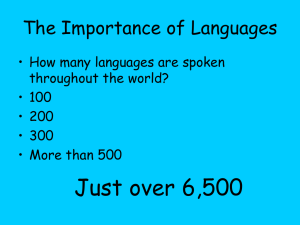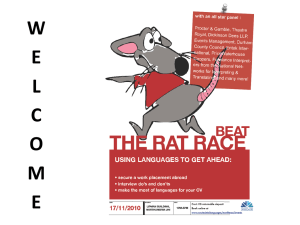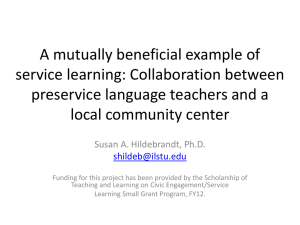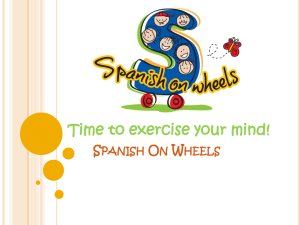Core skills - University of Southampton
advertisement
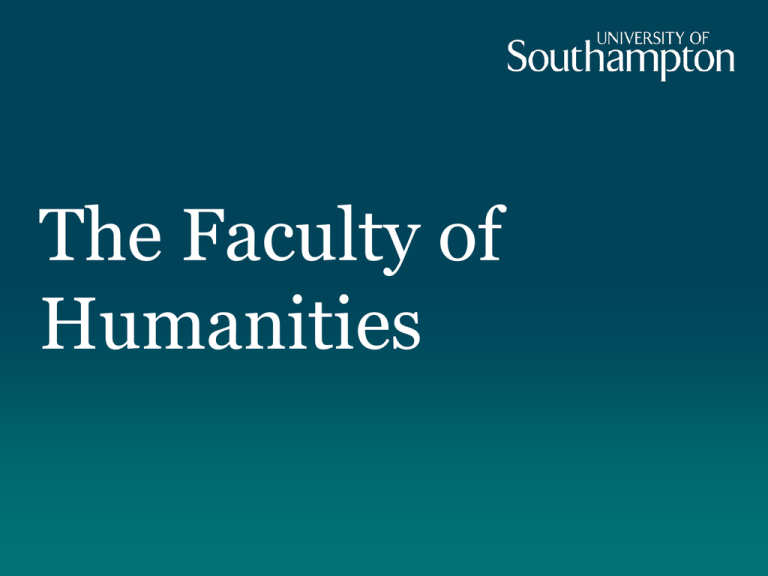
The Faculty of Humanities The Faculty of Humanities • Around 3,000 students at Avenue and Highfield Campuses • Seven academic disciplines – Archaeology, English, Film, History, Modern Languages, Music & Philosophy • One of six campuses at a multicampus university • Dedicated to the Faculty of Humanities • Humanities library • Computer suites and wi-fi study areas • Language labs and resources • Café, courtyard 2 Over 60 Courses • Archaeology • Music • Spanish • Archaeology and Geography • Music and Management • The Spanish-speaking World • Archaeology and History • Contemporary Europe • English • English and French • English and German • English and Spanish • English and History • English and Music • Film • Film and English • Film and French • Film and German • Film and Spanish • Film and History • Film and Philosophy • History • French and History • German and History • Spanish and History • Modern History and Politics • Philosophy • Spanish and Latin-American Studies • Philosophy and Mathematics • Contemporary Europe (English) • Economics and Philosophy • Politics and French • Philosophy and Politics • Politics and German • Philosophy and Sociology • Management Sciences and German • Philosophy and History • French and German • Philosophy and Music • French and Spanish • Philosophy and English • French and Portuguese • German and Spanish • Spanish and Portuguese • Modern Languages • French and German (Linguistic Studies) • Language Learning • French and Spanish (Linguistic Studies) • Applied English Language Studies • German and Spanish (Linguistic Studies) • Contemporary Europe (British Studies) • • Language and Society Politics and Spanish/Portuguese and LatinAmerican Studies • French (Linguistic Studies) • French and Philosophy • French • German and Philosophy • German (Linguistic Studies) • French and Music • German • German and Music • Spanish (Linguistic Studies) • Management Sciences and Spanish • Management Sciences and French 3 A Flexible Degree • Joint honours or combined honours courses are an exciting alternative to studying one subject at university • Majors and Minors (five modules over course of degree) • Students can take up to two alternative subject modules each year to vary a single honours degree. • Curriculum Innovation Programme – Students who do not want to narrow their field of study – Keeps education and career options open – Allows students to experience a wide range of study 4 Typical Entry Requirements Archaeology English Film History Modern Languages Music Philosophy AAB AAB, A in English AAB AAB, A in History AAB, A in Language ABB, B Music, Grade 8 AAB Typically 70 places Typically 180 places Typically 70 places Typically 180 places Typically 150 places Typically 75 places Typically 75 places Or: ABB, including A in Degree subject and A in Extended Project (Music = BBB, B in Music, Grade 8 and A in Extended Project) IB: 34 points, 17 at higher level, including 6 at higher level Typical offers mean that applications/place doesn’t matter – however we receive about 6000 applications annually 5 Access to Southampton Criteria In order be eligible to apply to this programme students must meet a minimum of 2 of the following criteria: • Be in receipt of a 16-19 Bursary or similar grant • In the first generation of your immediate family to apply to Higher Education • Attend a secondary school which achieved less than 53% 5 A to C passes (including English and Maths) at GCSE in 2012 • Studies disrupted by circumstances in your personal, social or domestic life • Living or grew up in public care 6 Research-led teaching • Teaching on research topics by an expert academic • Teaching on the cutting edge developments in research • Research Assessment Exercise: – over 60% of the research submitted in 27 subject areas was considered of internationally excellent or world-leading quality 8 Teaching & assessment methods? • Lectures important in Years 1 & 2 • Seminars cover a variety of different teaching approaches: intensive teaching in small groups • Innovative forms of assessment, while still recognising the importance of essays (exams never more than 50%) • Regular opportunities to discuss work directly with tutors 9 Increasing specialisation 50% essays, presentations Never more than 50% examinations 10 Student Support and Resources? • Academic advisor • Hartley Library: the largest university library in the South of England with over 1.5 million books: a rich archive collection. • Avenue Campus: library and computing facilities • Electronic Learning • Field Trips • Societies 11 Employability A Humanities degree is highly respected and as such we have strong links with many sought after local, national and international recruiters The Faculty encourages students to work with: • Career Destinations - the University careers service – They provide CV and Interview support, help with placements and work experience, careers fairs and information on a wide range of graduate careers • Charity and not-for-profit organisations in Southampton in fields as varied as conservation, social welfare and the arts • Student Societies • The Graduate Passport – a programme of personal development taken over the course of your degree programme What can you do with a degree in History? Core skills Specialist careers • Research • Education • Analysis • Politics and Government • Critical thinking • Civil Service • Journalism and Media • Initiative and independence • Think tanks • Judgement and reasoning • Multinationals • Team work • International institutions • Development charities • Written communication • Law • Presentation skills • Postgraduate study Jobs and Employers Advertising Account Executive - PR Assistant - Accountant - Festival Coordinator Credit Controller - Project Manager - Editorial Assistant - Teaching Assistant - Website Community Editor - Market Analyst - Marketing Officer - Recruitment Consultant Retail Manager - Archaeologist - TV Presenter - Army Officer - Library Assistant Museums Assistant - Music Teacher - Singer - Orchestral Manager - Auditor - Teacher Police Officer - Events Manager - Quantity Surveyor - Vocal Coach - Civil Servant - ELearning Facilitator - Risk Manager - TEFL Teacher - Translator - Bilingual Administrator - Paralegal - Political Researcher - Travel Writer & Researcher Marketing Consultant - Translator Arcadia - British Council - PricewaterhouseCoopers - Aker Kvaerner - Imperial War Museum - Wessex Archaeology - Blackwells - Government of Luxembourg - HM Revenue & Customs - Talkback Thames - Hampshire County Council - Civil Service IBM - Royal Air Force - Bank of New York - Deloitte - Ernst & Young - Toyota Microsoft - British Council - J P Morgan - World Bank - Jaguar - Lego - BBC - British Airways - Majestic Wine - Ernst & Young - House of Commons - Grant Thornton Scarborough Museums Trust - Welsh Assembly - Aylesbury Music Centre Musician National Theatre - Oxfordshire County Music Service – ITN – IPSOS Mori – English Heritage Source: Destination of Leavers from Higher Education Survey for School of Humanities 2010 14 Graduate Success Typically, 90% of Humanities students are employed or in further study six months after graduation Source: Destination of Leavers from Higher Education Survey for School of Humanities 2009 15 The Personal Statement “Reading a very good personal statement doesn't tell you anything about the student because you cannot be sure that it's the work of the person concerned.” Geoff Parks, Director of Admissions, Cambridge quoted from The Guardian Online 19/05/09 16 What do we look for? • Independent and critical thinking • Inquiring mind and curiosity • Research skills • Organisation and motivation • Understanding of importance and relevance of studying their subject in today’s society 17 The Personal Statement 80-90% Academic Why do you want to study the subject? What skills do you possess that will make you a good student of the subject? Who or what has inspired you? What aspects of the subject have you/do you want to explore further? Additional Experience and Skills Hobbies and Interests Summarise why you will 18 be a good choice Would you recommend the University to a Friend or a Relative? 95.3% 19 Source: University of Southampton Student Experience Questionnaire 2009 – Humanities Students Get in Touch! H.spurling@southampton.ac.uk ugapply.fh@southampton.ac.uk +44 (0) 23 8059 9339 www.southampton.ac.uk/humanities
